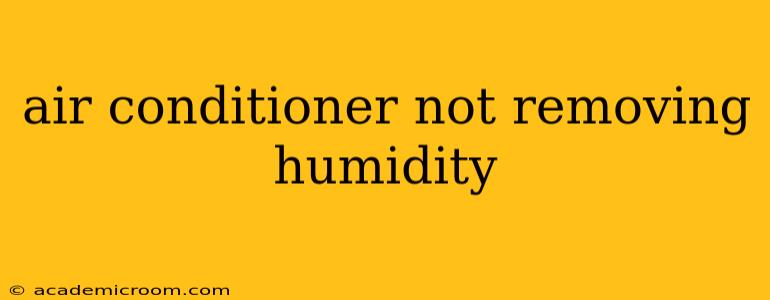Is your air conditioner struggling to remove humidity from your home, leaving you feeling sticky and uncomfortable even when the temperature is cool? This is a common problem with several potential causes. Let's dive into the most frequent reasons why your AC isn't dehumidifying effectively and how you can fix them.
Why Isn't My Air Conditioner Dehumidifying?
Many factors can contribute to an air conditioner's inability to adequately remove humidity. Understanding these will help you pinpoint the problem and find the right solution.
1. Is the Air Conditioner the Right Size for Your Space?
An improperly sized air conditioner is a common culprit. A unit that's too small will struggle to cool and dehumidify the space effectively, running constantly without achieving optimal results. Conversely, a unit that's too large will cool the space too quickly, not running long enough to properly dehumidify. The ideal AC unit should be appropriately sized for the square footage of the room or area it's cooling. Consult a professional HVAC technician for accurate sizing calculations.
2. Is the Air Filter Clean?
A clogged air filter restricts airflow, reducing the AC's efficiency and ability to dehumidify. A dirty filter forces the unit to work harder, potentially leading to overheating and decreased performance. Check your filter regularly and replace it according to the manufacturer's recommendations (usually every 1-3 months).
3. Are the Vents and Registers Obstructed?
Blocked vents and registers impede airflow, similar to a dirty filter. Ensure all vents are open and free from obstructions like furniture or curtains. Proper airflow is essential for effective cooling and dehumidification.
4. Is the Evaporator Coil Frozen?
A frozen evaporator coil is a serious problem that prevents proper airflow and dehumidification. This often happens due to restricted airflow (dirty filter, blocked vents), low refrigerant levels, or a faulty blower motor. If you suspect a frozen coil, turn off your AC immediately and call a qualified HVAC technician.
5. Is There a Refrigerant Leak?
Refrigerant is crucial for both cooling and dehumidification. A leak will significantly reduce the AC's ability to perform its functions. A low refrigerant level requires professional attention; attempting to recharge it yourself can be dangerous and potentially damage the unit. Contact a qualified technician for refrigerant checks and repairs.
6. Is the Drain Line Clogged?
The condensate drain line removes excess moisture from the air conditioner. A clogged drain line will cause water to back up and potentially freeze the evaporator coil, hindering dehumidification. Regularly check and clean the drain line to prevent clogs.
7. Is the AC Unit Properly Maintained?
Regular maintenance is crucial for optimal performance and longevity. Schedule annual professional maintenance to ensure your AC is operating at peak efficiency and identify potential issues before they become major problems. This includes cleaning coils, checking refrigerant levels, and inspecting electrical components.
8. Is the Humidity Level Set Too Low?
While you might desire extremely low humidity, setting your dehumidification settings too low can strain the unit and prevent it from properly managing the moisture levels. A more moderate setting might be more effective and sustainable.
9. Is the Outside Air Too Humid?
Your air conditioner's ability to dehumidify is affected by the outside humidity level. On extremely humid days, it might struggle to achieve the desired indoor humidity levels, even if functioning correctly.
10. Is the Unit Old or Worn Out?
Older air conditioners can lose their dehumidifying capabilities over time due to wear and tear on components. If your AC is quite old, it might be time to consider a replacement for optimal performance.
By addressing these potential issues, you'll significantly increase the chances of restoring your air conditioner's dehumidifying power. Remember, for serious issues like refrigerant leaks or frozen coils, always consult a qualified HVAC technician. Attempting repairs yourself could cause further damage or even create safety hazards.
